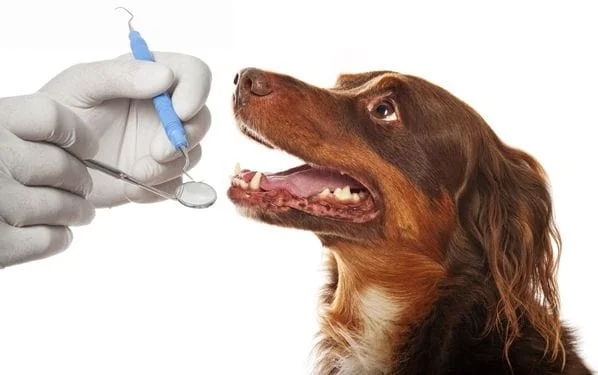When was the last time you had your pet’s teeth cleaned? According to the AVMA, most pets will have signs of dental disease by the time they are three years old. For that reason, our veterinarians do their best to monitor dental health and encourage early intervention (dental exams, x-rays, and cleaning) when needed to keep your pet's smile healthy.

Gum Disease in Dogs and Cats
Dogs and cats are prone to developing some of the same types of dental diseases and problems as humans. There of particular concern are gingivitis, and periodontal disease.
When your pet eats food, particles get on their teeth and gums. This fuels the bacteria in your pet’s mouth, causing an acid attack on the enamel of their teeth and creating a sticky, clear substance called plaque. If the plaque is left on teeth it mineralizes and hardens. When plaque and tartar are left on your pet’s teeth for an extended period of time, it can lead to gingivitis, periodontal disease. If not treated in time the end result will be loose, infected, painful teeth.
Signs of Dental Disease in Pets
When it comes to detecting potential oral health problems in pets, owners must be vigilant in noticing changes in behavior. This is because pets often do not act like they are in pain until the pain is severe. If you notice any of the signs below, it is important that you contact us to schedule a dental checkup, teeth cleaning and gum disease treatment.
- Broken or Loose Teeth
- Discomfort While Eating
- Extremely Bad Breath
- Drooling
- Red Gums
- Staining on the Teeth
- Swollen or Inflamed Gums
- Weight Loss or Loss of Appetite
The Hazards of Untreated Periodontal Disease in Pets
Untreated periodontal disease in dogs and cats can lead to dangerous infections, like abscesses and blood infections. Advanced dental disease may also affect your pet’s heart, liver and kidneys. At the very least, it will cause a great deal of pain for your furry little friend (much more than they often show). Home dental care is a very important part of maintaining a pet's long term health and quality of life. Just like us, though, brushing is not enough. Dog's and cats all require professional cleanings and careful dental assessments throughout their lives (on average most pets have signs of dental disease starting between 2 and 5 years of age). Work with your veterinarian to design a home dental care program, and to learn when to take the next step in dental assessment and care.
Pet Dental Cleanings in Edmonton
Proper thorough dental assessment and cleaning can only be done with the pet under anesthesia.
Once the basic examination is complete, your veterinarian will completely clean all the plaque and tartar from your pet’s teeth and below the gum line. This is followed by complete oral x-rays and probing gums for pockets and other signs of disease. Teeth that may be beyond saving (based on standard guidelines regarding bone loss and root health) should be extracted or the pet referred to a dental specialist for alternative treatment if possible/appropriate. Once your pet’s teeth are clean we can give you tips and tricks to help you remove food particles and plaque at home to keep those teeth healthy as long as possible before the next cleaning is needed.
To learn more about our veterinary dental services and how they can protect the health of your pet, call us at (780) 466-4030 today.


